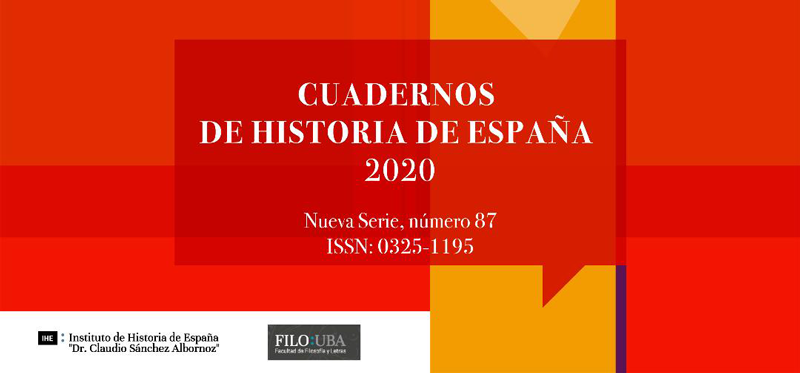La Alemania nazi y el fascismo español durante la Guerra Civil
Palabras clave:
fascismo, falangismo, Guerra Civil española, Alemania nazi, partido nazi
Resumen
El presente artículo reflexiona sobre las relaciones establecidas por la Alemania nazi durante la Guerra Civil española primero con el partido fascista español Falange Española de las JONS y posteriormente, desde el momento de su creación, con el partido único del régimen franquista, Falange Española Tradicionalista y de las JONS. Analiza los orígenes y desarrollo de dichas relaciones, centrándose en las de tipo político del Estado y del partido nazis establecidas por el Encargado de Negocios y después embajador general Faupel, caracterizadas por un extremado intervencionismo, así como las de su sucesor, el diplomático profesional von Stohrer, caracterizadas por una actitud más distanciada. El artículo incluye igualmente un análisis de las relaciones económicas, militares y policiales entre el régimen nazi y el Estado franquista durante la contienda.Descargas
La descarga de datos todavía no está disponible.
Citas
Bernecker, W. (1982). Colectividades y revolución social. El anarquismo en la guerra civil española. Barcelona: Crítica.
Bernecker, W. (2002). “Alemania y España en la época del nacionalsindicalismo”, en Vega Cernuda, M.A.-Henning, W. (eds.). España y Alemania. Percepciones mutuas de cinco siglos de historia. Madrid: Editorial Complutense, 155-184.
Bowen, W.H. (2000). Spaniards and Nazi Germany. Collaboration in the New Order. Missouri: The University of Missouri Press.
Documents on Foreign German Policy 1918-1945, (DFGP) (1951) Series D, Volume III, London: His Majesty Stationery Office.
García Pérez, R. (1994). Franquismo y Tercer Reich. Las relaciones económicas hispano-alemanas durante la Segunda Guerra Mundial. Madrid: Centro de Estudios Constitucionales.
Gliech, O. (2003). “Wilhelm Faupel. Generalstabsoffizier, Militärberater, Präsident des Ibero-Amerikanischen Instituts” en Liehr, R. et al (eds.), (2003). Ein Institut und sein General. Wilhelm Faupel und das Ibero-Amerikanische Institut in der Zeit des Nationalsozialismus. Frankfurt am Main: Vervuert Verlag, 131-279.
Gómez Molina, A.-Thomàs, J.M. (2003). Serrano Suñer. Barcelona: Ediciones B.
Griffin, Roger (1991). The nature of fascism. London: Pinter.
Janué Miret, M. (2013). “La atracción del falangismo a la causa nacionalsocialista por parte de la Sociedad Germano-Española de Berlín durante la Guerra Civil Española”, en Ruiz Carnicer, M.A. (ed.), Falange. Las culturas políticas del fascismo en España (1936-1975). Zaragona: Institución “Fernando El Católico”/CSIC, 240-261.
Les Archives secrètes de la Wilhemstrasse III: L’Allemagne et la Guerre Civile Espagnole (1936-1939). París: Plon.
Merkes, M. (1969). Die deutsche Politik gegenüber dem spanischen Bürgerkrieg, 1936-1939. Bonn: Röhrscheid
Morant i Ariño, T. (2013a). Las relaciones y visitas entre la Sección Femenina de Falange y las organizaciones femeninas nazis, 1936-1945. Tesis Doctoral inédita. València: Universitat de València.
Morant i Ariño, T. (2013b). “‘Todo ha sido como en cine’. El viatge d’un grup d’Auxilio Social a Alemanya, tardor de 1937”, en Ruiz Carnicer, M.A. (ed.). Falange. Las culturas políticas del fascismo en España (1936-1975). Zaragona: Institución “Fernando El Católico”/CSIC, 317-334.
Núñez Seixas, X.M. (2015). “Falangismo, nacionalsocialismo y el mito de Hitler en España (1931-1945). Revista de Estudios Políticos, núm. 169, 13-43.
Paxton, Robert O. (1995). Anatomía del fascismo. Barcelona: Península.
Payne, Stanley G. (1995). Historia del fascismo. Barcelona: Planeta.
Payne, S.G. (2008). Franco y Hitler. España, Alemania, la Segunda Guerra Mundial y el Holocausto. Madrid: La Esfera de los Libros.
Ruhl, K.J. (1986). Franco, Falange y Tercer Reich. Madrid: Akal.
Sáenz-Francés San Baldomero, E. (2006), “Los diarios secretos del embajador von Moltke. Un estudio preliminar”, en Letras de Deusto, Volumen 36, 110, 85-134.
Sáenz-Francés San Baldomero, E. (2009), Entre la antorcha y la esvástica. Franco en la encrucijada de la Segunda Guerra Mundial. Madrid: Actas.
Saz, I. (1996). “La peculiaritat del feixisme espanyol”. Afers, 25, 624-637.
Serrano Suñer, R. (1973). Entre Hendaya y Gibraltar. Barcelona: Nauta.
Thomàs, J.M. (1999). Lo que fue la Falange. La Falange y los falangistas de José Antonio. Hedilla y la Unificación. Franco y el fin de la Falange Española de las JONS. Barcelona: Plaza&Janés.
Thomàs, J.M. (2001). La Falange de Franco. Fascismo y fascistización en el régimen franquista (1937-1945). Barcelona: Plaza y Janés.
Thomàs, J.M. (2016). Franquistas contra franquistas. Luchas por el poder en la cúpula del régimen de Franco. Barcelona: Debate/Penguim Random House.
Thomàs, J.M. (2017). José Antonio. Realidad y mito. Barcelona: Debate/Penguim Random House. Edición en lengua inglesa (2019). José Antonio Primo de Rivera. The Reality and Myth of a Spanish Fascist leader. London-New York: Beghahn Books.
Viñas, A. (1977). La Alemania nazi y el 18 de julio. Madrid: Alianza.
Viñas, A. (1984). Guerra, dinero y dictadura. Ayuda fascista y autarquía en España. Barcelona: Crítica.
Whealey, R.H. (1989). The Nazi role in the Spanish Civil War. Lexington: The University Press of Kentucky.
Bernecker, W. (2002). “Alemania y España en la época del nacionalsindicalismo”, en Vega Cernuda, M.A.-Henning, W. (eds.). España y Alemania. Percepciones mutuas de cinco siglos de historia. Madrid: Editorial Complutense, 155-184.
Bowen, W.H. (2000). Spaniards and Nazi Germany. Collaboration in the New Order. Missouri: The University of Missouri Press.
Documents on Foreign German Policy 1918-1945, (DFGP) (1951) Series D, Volume III, London: His Majesty Stationery Office.
García Pérez, R. (1994). Franquismo y Tercer Reich. Las relaciones económicas hispano-alemanas durante la Segunda Guerra Mundial. Madrid: Centro de Estudios Constitucionales.
Gliech, O. (2003). “Wilhelm Faupel. Generalstabsoffizier, Militärberater, Präsident des Ibero-Amerikanischen Instituts” en Liehr, R. et al (eds.), (2003). Ein Institut und sein General. Wilhelm Faupel und das Ibero-Amerikanische Institut in der Zeit des Nationalsozialismus. Frankfurt am Main: Vervuert Verlag, 131-279.
Gómez Molina, A.-Thomàs, J.M. (2003). Serrano Suñer. Barcelona: Ediciones B.
Griffin, Roger (1991). The nature of fascism. London: Pinter.
Janué Miret, M. (2013). “La atracción del falangismo a la causa nacionalsocialista por parte de la Sociedad Germano-Española de Berlín durante la Guerra Civil Española”, en Ruiz Carnicer, M.A. (ed.), Falange. Las culturas políticas del fascismo en España (1936-1975). Zaragona: Institución “Fernando El Católico”/CSIC, 240-261.
Les Archives secrètes de la Wilhemstrasse III: L’Allemagne et la Guerre Civile Espagnole (1936-1939). París: Plon.
Merkes, M. (1969). Die deutsche Politik gegenüber dem spanischen Bürgerkrieg, 1936-1939. Bonn: Röhrscheid
Morant i Ariño, T. (2013a). Las relaciones y visitas entre la Sección Femenina de Falange y las organizaciones femeninas nazis, 1936-1945. Tesis Doctoral inédita. València: Universitat de València.
Morant i Ariño, T. (2013b). “‘Todo ha sido como en cine’. El viatge d’un grup d’Auxilio Social a Alemanya, tardor de 1937”, en Ruiz Carnicer, M.A. (ed.). Falange. Las culturas políticas del fascismo en España (1936-1975). Zaragona: Institución “Fernando El Católico”/CSIC, 317-334.
Núñez Seixas, X.M. (2015). “Falangismo, nacionalsocialismo y el mito de Hitler en España (1931-1945). Revista de Estudios Políticos, núm. 169, 13-43.
Paxton, Robert O. (1995). Anatomía del fascismo. Barcelona: Península.
Payne, Stanley G. (1995). Historia del fascismo. Barcelona: Planeta.
Payne, S.G. (2008). Franco y Hitler. España, Alemania, la Segunda Guerra Mundial y el Holocausto. Madrid: La Esfera de los Libros.
Ruhl, K.J. (1986). Franco, Falange y Tercer Reich. Madrid: Akal.
Sáenz-Francés San Baldomero, E. (2006), “Los diarios secretos del embajador von Moltke. Un estudio preliminar”, en Letras de Deusto, Volumen 36, 110, 85-134.
Sáenz-Francés San Baldomero, E. (2009), Entre la antorcha y la esvástica. Franco en la encrucijada de la Segunda Guerra Mundial. Madrid: Actas.
Saz, I. (1996). “La peculiaritat del feixisme espanyol”. Afers, 25, 624-637.
Serrano Suñer, R. (1973). Entre Hendaya y Gibraltar. Barcelona: Nauta.
Thomàs, J.M. (1999). Lo que fue la Falange. La Falange y los falangistas de José Antonio. Hedilla y la Unificación. Franco y el fin de la Falange Española de las JONS. Barcelona: Plaza&Janés.
Thomàs, J.M. (2001). La Falange de Franco. Fascismo y fascistización en el régimen franquista (1937-1945). Barcelona: Plaza y Janés.
Thomàs, J.M. (2016). Franquistas contra franquistas. Luchas por el poder en la cúpula del régimen de Franco. Barcelona: Debate/Penguim Random House.
Thomàs, J.M. (2017). José Antonio. Realidad y mito. Barcelona: Debate/Penguim Random House. Edición en lengua inglesa (2019). José Antonio Primo de Rivera. The Reality and Myth of a Spanish Fascist leader. London-New York: Beghahn Books.
Viñas, A. (1977). La Alemania nazi y el 18 de julio. Madrid: Alianza.
Viñas, A. (1984). Guerra, dinero y dictadura. Ayuda fascista y autarquía en España. Barcelona: Crítica.
Whealey, R.H. (1989). The Nazi role in the Spanish Civil War. Lexington: The University Press of Kentucky.
Publicado
2020-11-30
Cómo citar
Thomàs, J. M. (2020). La Alemania nazi y el fascismo español durante la Guerra Civil. Cuadernos De Historia De España, (87), 37-54. https://doi.org/10.34096/che.n87.9047
Número
Sección
Dossier. La Guerra Civil española en perspectiva global









.png)












.png)
.png)
.png)








